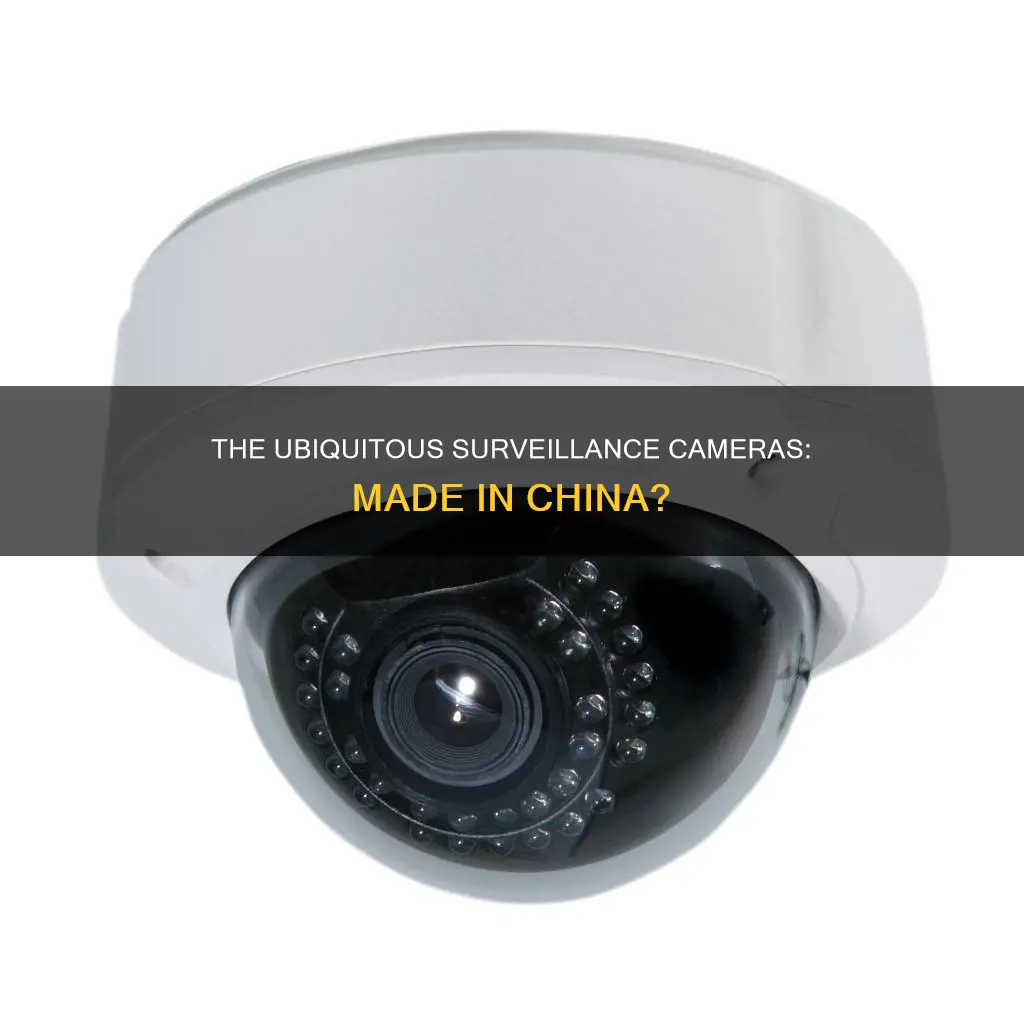
Surveillance cameras are everywhere, and it's no surprise that many of them are made in China. In fact, two Chinese companies, Hikvision and Dahua, make about 90% of the IP cameras on the market today. This dominance has raised concerns about security vulnerabilities, data practices, and ties to the Chinese state. While some countries like the US have blacklisted these firms, their products are still widely used in Europe and other parts of the world. So, are all surveillance cameras made in China? The answer is no. There are several non-Chinese manufacturers in the market, offering alternatives for those who want to avoid Chinese-made cameras. These companies are based in countries like the US, South Korea, Taiwan, Japan, and Europe. While the global supply chain is interconnected, and components from various countries may be used in production, it is possible to find surveillance cameras that are not made in China if one has concerns about the origin of the products.
| Characteristics | Values |
|---|---|
| Percentage of IP Cameras on the Market Made in China | 90% |
| Countries that Make Non-Chinese Security Cameras | Sweden, United States, Taiwan, South Korea, Germany, Japan, Canada |
| Examples of Non-Chinese Security Camera Manufacturers | Axis, Avigilon, Digital Watchdog, Arecont Vision, Honeywell, Pelco, Speco, Ubiquity, Hanwha Techwin, ACTi, GeoVision, Vivotek |
| Examples of Chinese Security Camera Manufacturers | Hikvision, Dahua, Uniview |
What You'll Learn
- Surveillance cameras manufactured in China are used in several countries
- The US has banned the import of certain Chinese surveillance equipment
- Chinese surveillance cameras are susceptible to hacking
- Chinese surveillance cameras are spreading across Eastern Europe
- Surveillance cameras not manufactured in China

Surveillance cameras manufactured in China are used in several countries
China also supplies surveillance technology to most of the world and has a dominant position in the mass surveillance industry. For example, China supplied surveillance technology to Hong Kong, which has resulted in increased surveillance and the intrusion of digital authoritarianism in the region.
Additionally, Chinese companies such as Dahua Technology and Hikvision, which are two of the biggest manufacturers of surveillance cameras, have a significant global presence. Their products are used in various countries, including the United States, where they hold a large market share.
It is worth noting that there are concerns about the use of Chinese-made surveillance cameras due to potential security risks and the involvement of the Chinese government in mass surveillance. As a result, some countries, like the United States, have implemented bans or restrictions on the use of Chinese-made surveillance equipment in certain sensitive areas.
Charging Your Action Camera: A Quick Guide
You may want to see also

The US has banned the import of certain Chinese surveillance equipment
The US government has taken steps to address the threat posed by foreign technology to its consumers. In November 2022, the Federal Communications Commission (FCC) issued an order prohibiting the import or sale of any new Huawei and ZTE products and services. The order also severely limits the import or sale of new video surveillance and telecommunications equipment produced by Hytera, Hikvision, and Dahua. These companies sell telecommunications equipment and video surveillance technology in the United States, but the FCC's move will keep some of their products off the shelves.
The FCC's decision was based on the Secure Equipment Act of 2021, which states that the FCC will no longer review or approve applications for equipment authorization for equipment on the list of covered communications equipment or services. This list includes technologies that raise national security concerns. While the order does not impose an immediate ban on the importation or use of already-licensed equipment, it promises to shape the domestic market as the supply of currently approved equipment decreases.
The US government's actions are part of a broader trend of increasing scrutiny on Chinese technology companies and their products. For example, in 2018, the United States imposed a 10% tariff on much of the electronic equipment manufactured in China, and this tariff was increased to 25% in 2019. Additionally, in 2019, the US government passed a resolution preventing federal agencies and those involved with national security from purchasing surveillance cameras manufactured in four specific factories in China, including the two leading Chinese camera manufacturers, Hikvision and Dahua.
The impact of these bans and restrictions is significant, as China manufactures about 90% of the IP cameras on the market today. However, there are still options for consumers who wish to avoid Chinese-made surveillance equipment. Several top-quality security camera manufacturers are based in other countries, such as the United States, Sweden, Taiwan, and South Korea.
Unlocking Creative Photography with the Sports Mode
You may want to see also

Chinese surveillance cameras are susceptible to hacking
In an experiment conducted by Panorama, a hacker was able to infiltrate the system and observe a BBC employee entering their password on their laptop. This incident highlights the potential for unauthorized access to sensitive information. The widespread use of Hikvision and Dahua cameras in various settings, including government buildings, further underscores the urgency of addressing these security vulnerabilities.
The security weaknesses in Chinese-made surveillance cameras can be exploited to gain unauthorized access and potentially compromise privacy and security. In one case, a researcher disclosed a backdoor vulnerability in Dahua cameras that allowed attackers to eavesdrop on users even when the audio was disabled. This issue affected millions of cameras deployed in the U.S. and Europe, highlighting the reach and impact of such vulnerabilities.
To protect against potential attacks, organizations must prioritize the replacement or upgrading of vulnerable cameras and implement robust cybersecurity measures. This includes regular firmware updates, network segmentation, and strong access controls. The revelations regarding the security flaws in Chinese-made surveillance cameras serve as a wake-up call for governments, businesses, and individuals, emphasizing the need to collaborate and develop comprehensive security strategies to safeguard against unauthorized access and potential disruptions.
Charging the Blackmagic Camera: A Step-by-Step Guide
You may want to see also

Chinese surveillance cameras are spreading across Eastern Europe
Chinese-made surveillance cameras are spreading across Eastern Europe, with countries in the region purchasing millions of them over the last five years. This is despite security flaws in the devices and concerns about the manufacturers' ties to the Chinese state and lax data practices.
The Spread of Chinese Surveillance Cameras
Research conducted in nine countries reveals that Chinese companies Dahua and Hikvision dominate the markets in Hungary, Serbia, Romania, Moldova, Ukraine, Bosnia and Herzegovina, Kosovo, Bulgaria, and Georgia. These two companies are among the world's leading providers of closed-circuit television and surveillance systems and are partially owned by the Chinese state.
The use of Chinese-made cameras has been reported in countries that are members of the EU and NATO or aspiring to join. Budget-conscious governments in these countries are turning to affordable and state-subsidized Chinese companies.
Security Concerns
There are concerns about the security vulnerabilities of Chinese-made cameras and the potential risk of hacking and foreign adversaries. For example, in Romania, Chinese-made cameras have been installed at military bases, and in Hungary, they are used at special police headquarters.
In addition, there are concerns about the manufacturers' ties to the Chinese state and their lax data practices. Conor Healy, the director of government research at IPVM, a surveillance-industry research firm, highlighted the extensive catalogue of vulnerabilities in Chinese-made cameras that could be exploited.
US and European Bans
The United States, Britain, and Australia have blacklisted Dahua and Hikvision, but no such ban exists in Europe. However, there is increasing scrutiny in Western capitals about the overreliance on Chinese technology in critical infrastructure.
The Future of Chinese Surveillance Cameras in Eastern Europe
The spread of Chinese surveillance cameras in Eastern Europe marks a potential flashpoint in the region, especially as ties between China and some countries, such as Hungary, deepen. For example, Hungary signed a security deal with China in February 2024 to enhance cooperation between their law enforcement agencies, raising concerns among Chinese activists abroad and in Brussels.
Momentum Camera: Battery Power Options Explored
You may want to see also

Surveillance cameras not manufactured in China
While China manufacturers about 90% of the IP cameras on the market today, there are still several top-quality security camera manufacturers in other countries.
United States
Arecont Vision, Digital Watchdog, Honeywell, Pelco, Speco Technologies, Ubiquity, and Wyze are all US-based companies that manufacture security cameras. However, it is worth noting that Wyze has received some criticism for its products being made in China.
Sweden
Axis Communications AB is a Swedish manufacturer of network cameras. They operate primarily in the physical security and video surveillance industries. Axis confirmed that their entire product portfolio is compliant with the National Defense Authorization Act (NDAA) and that any product not sold in China will not be manufactured there.
Germany
Bosch is a German multinational engineering and technology company that offers US-listed products compliant with the NDAA. Mobotix, another German company, also confirmed that their entire product portfolio is 100% NDAA-compliant.
South Korea
Hanwha Techwin (formerly Samsung Techwin) is a surveillance and optoelectronics company headquartered in South Korea. They confirmed that most of their product portfolio is NDAA-compliant.
Taiwan
GeoVision, a Taiwanese company, offers a wide range of IP camera models that contain System-on-Chips (SoCs) made in Taiwan, Japan, or the United States. ACTi, another Taiwan-based company, states that their cameras are made in Taiwan, Japan, and the United States.
Other Countries
VIVOTEK, a Taiwanese company, manufactures security cameras in Taiwan. SpotCam, another Taiwanese brand, offers some products made in Taiwan and others in China. 360 Vision Technology manufactures cameras in the United Kingdom.
Final Thoughts
It is important to note that the global supply chain is interconnected, and components from various countries may be used in the production of a single device. Additionally, some companies may have multiple manufacturing locations, so it is always a good idea to check the country of origin before purchasing.
AR Camera Mode: Enhancing Reality Through Your Lens
You may want to see also
Frequently asked questions
No, while China manufacturers about 90% of the IP cameras on the market, there are several top-quality security camera manufacturers in other countries.
Some countries that manufacture surveillance cameras besides China include the United States, South Korea, Taiwan, Japan, and several European countries like Germany, Sweden, and the United Kingdom.
Yes, several brands manufacture surveillance cameras outside of China. Some examples include Axis (Sweden), Arecont Vision (US), Digital Watchdog (US/South Korea), GeoVision (Taiwan), Honeywell (US), Pelco (US), and Ubiquiti (US).
There are various reasons why someone might prefer a surveillance camera not made in China. Some buyers may have security or privacy concerns due to the ties between Chinese manufacturers and the Chinese state. Others may want to support local businesses or diversify their supply chain. Additionally, in certain countries like the United States, there are restrictions on the use of Chinese-made surveillance equipment in specific sectors like the federal government and national security.







